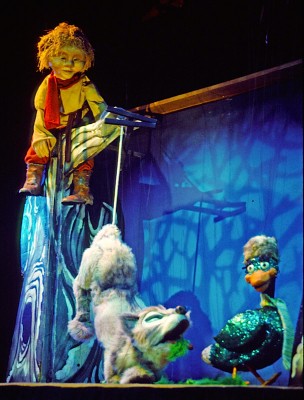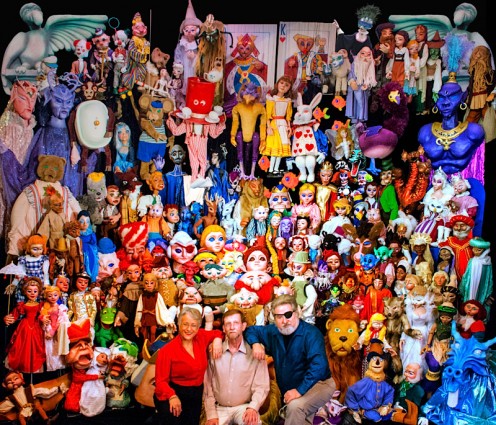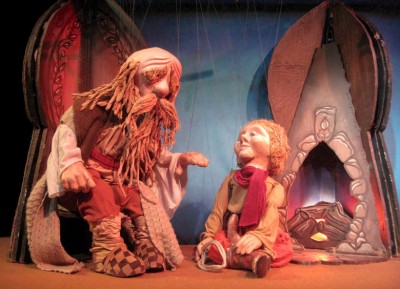After performing “Peter and the Wolf” some 3,000 times since the late 1960s, one might expect that Christopher Piper could do the show blindfolded and with his hands tied behind his back. That feat, though, is beyond the capabilities of even the vastly-accomplished man who is one-third of the team that runs the Puppet Co. Playhouse in Glen Echo Park.
In the one-man show based on Sergei Prokiev’s 1936 children’s piece—for which the Russian composer wrote the music for the orchestra as well as the text for the narrator—Piper performs six different character voices, while “holding a puppet in each hand, operating the lights and sound cues. I even operate a puppet with my toes,” he said. “Not bad for a 64-year-old.”

As a child, Piper traveled all across the country with his parents, helping them create and perform their puppet shows. The second-generation Puppet Master, who described himself as “a born tinkerer (who) has always worked with the magic of animation and illusion,” said his father did the show “more than twice that number since his initial opening in the early 1950s.”
During Piper’s four years as a theater major at the University of Hawaii, he performed annually at 95 percent of the state’s elementary schools—including the ones on the outer islands, he noted. And on his summer breaks, he and his family would build “custom animated funhouses, dark rides and animated displays. He moved to the D.C. area in 1980 to start a “theater for the art of puppetry.” The Puppet Co. Playhouse, he said, which he founded three years later with Allan Stevens, is “a showplace for his writing, musical, sculpting and mechanical talents, and a laboratory in which to research new techniques using computers and electronics in his craft.”
Piper serves as the company’s artistic director and president of its board of directors; he also served two terms as Puppeteers of America’s Mid-Atlantic regional director. Stevens is the Puppet Co.’s CEO and Piper’s wife, MayField Piper, is the general manager. The third incarnation of the playhouse, designed by Stevens and the Pipers “from the ground up, specifically for the art of puppetry,” Piper said, opened in 2004. “It is one of a few such in the country,” he noted.

With “Peter and the Wolf” on stage at the playhouse, again, Piper addressed the challenges particular to doing the solo show. Preparation is key. “One has to deal with any mishaps that occur without interrupting the flow of the show, and hopefully keeping the audience unaware that one is desperately trying to compensate for the mishap,” he said. “If a puppet is not preset correctly, is tangled, or has a frayed or broken string, it can affect the entire show.”
“Of course,” he acknowledged, “everything is choreographed far in advance, and most variables are accounted for, but there is always the potential for disaster.”
Choosing a favorite show of the 24 currently part of the playhouse’s Mainstage repertory is not easy for Piper, he said, because the company varies its style and source material so much. He selected “A Midsummer Night’s Dream” and “Mozart’s The Magic Flute” as “the most sophisticated, and I am rather proud of having adapted adult material to be accessible to younger audiences without ‘dumbing it down.’” The “most elegant,” he said, is “Cinderella,” and the funniest is “Little Red Riding Hood and the 3 Little Pigs.”
When it comes to the company’s two versions of “Pinocchio,” Piper said that “choosing between them would be like choosing between fraternal twins.” The first version uses restored marionettes that Piper’s father built, and Stevens created the other.
“‘Peter and the Wolf,’” he said, “is certainly the most impactful in that it truly illustrates how classical music can create a sense of drama within a ripping good story.”

Puppet Co. productions are designed to appeal to all ages, from 4-year-olds to adults. “We have a theory that if the adults aren’t entertained, the kids won’t be so for long,” Piper explained. “We create theater that is accessible to children, and ensure that kids can understand plot line and character motivation.” While some shows may “have a little slapstick humor, most of the humor is character driven,” he said. “I could say that the humor is on a sliding scale, as the more experience a child has, the funnier a particular show will be. An 8- or 10-year-old will get more out of a show than their younger siblings, but not as much as their parents.”
Behinds the scenes, the Puppet Co. trio is “concentrating our efforts on restoring and documenting the shows already in the repertoire, some of which are more than 30 years old,” Piper said. “We are preparing for a time when our founders will step away from performance and bring in younger performers and artists that will carry on the work we have created, and hopefully create new works of their own under the Puppet Co. banner.” And not surprisingly, they are working on one more extraordinary idea: developing “a children’s play park that will offer children and parents an immersive fantasy environment that will mirror many of the shows we have created.”
“Peter and the Wolf” is on stage at The Puppet Co. Playhouse in Glen Echo Park through Aug. 28. Shows are at 10 and 11:30 a.m. Thursday and Friday, and 11:30 a.m. and 1 p.m. Saturday and Sunday. An introduction to the instruments in the orchestra precedes the 40-minute show. Tickets are $12. Call 301-634-5380 or visit www.thepuppetco.org.